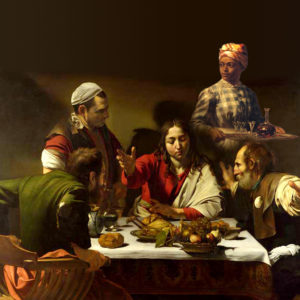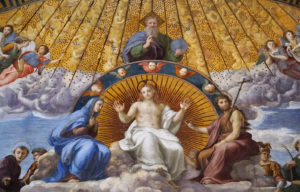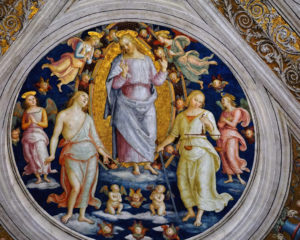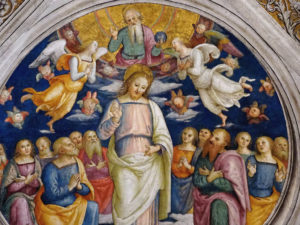Posted by Roberta Grimes • August 22, 2020 • 30 Comments
Jesus, The Teachings of Jesus
Imagine there’s no countries. It isn’t hard to do.
Nothing to kill or die for. And no religion too.
Imagine all the people living life in peace…
You may say that I’m a dreamer, but I’m not the only one.
I hope someday you’ll join us, and the world will be as one.
– John Lennon (1940-1980), from “Imagine” (1971)
 It is essential as we read the Lord’s Gospel words that we always keep in mind the fact that nothing Jesus is quoted as saying is a straight transcription. On the contrary! Our having even an approximation of the Lord’s truths today is a miracle. Here are some of the reasons why:
It is essential as we read the Lord’s Gospel words that we always keep in mind the fact that nothing Jesus is quoted as saying is a straight transcription. On the contrary! Our having even an approximation of the Lord’s truths today is a miracle. Here are some of the reasons why:
 When we read it cold, the Sermon on the Mount seems to hold some contradictions. But when we keep these four issues with the Gospels in mind, we are sitting at the feet of a master Teacher! Making allowances for the obstacles He faced, we see that everything Jesus said really does fit together and make sense. Furthermore, now we can check with the dead, and they consistently tell us all the same truths. Jesus couldn’t speak freely. His words were likely garbled by repetition and then edited for religious reasons. Still, by nothing less than the Grace of God His truth survives today!
When we read it cold, the Sermon on the Mount seems to hold some contradictions. But when we keep these four issues with the Gospels in mind, we are sitting at the feet of a master Teacher! Making allowances for the obstacles He faced, we see that everything Jesus said really does fit together and make sense. Furthermore, now we can check with the dead, and they consistently tell us all the same truths. Jesus couldn’t speak freely. His words were likely garbled by repetition and then edited for religious reasons. Still, by nothing less than the Grace of God His truth survives today!
Chapter Five of the Gospel Book of Matthew seems to be more randomly assembled than it is. Jesus tells us in the Beatitudes that begin the chapter how our spiritual growth will feel; then in the rest of it He shows us how to free ourselves from fear-based religious rules so we can rely on God’s Law of Love to help us begin to grow naturally. What follows the Beatitudes are two transitional statements, the first of which is a brief exhortation that we use the example of our lives well lived to share the truths that Jesus taught:
“You are the salt of the earth; but if the salt has become tasteless, how can it be made salty again? It is no longer good for anything, except to be thrown out and trampled under foot by men. You are the light of the world. A city set on a hill cannot be hidden; nor does anyone light a lamp and put it under a basket, but on the lampstand, and it gives light to all who are in the house. Let your light shine before men in such a way that they may see your good works, and glorify your Father who is in heaven (MT 5:14-16).
 Then comes the puzzling statement that despite His having replaced the Old Testament laws with God’s Law of Love, those old laws still survive. No doubt when He was saying these words He could see the Temple guards listening closely, so He was putting on a show to reassure them of His old-time orthodoxy. Note, though, how His last sentence transforms the meaning of this entire paragraph:
Then comes the puzzling statement that despite His having replaced the Old Testament laws with God’s Law of Love, those old laws still survive. No doubt when He was saying these words He could see the Temple guards listening closely, so He was putting on a show to reassure them of His old-time orthodoxy. Note, though, how His last sentence transforms the meaning of this entire paragraph:
“Do not think that I came to abolish the Law or the Prophets; I did not come to abolish but to fulfill. For truly I say to you, until heaven and earth pass away, not the smallest letter or stroke shall pass from the Law until all is accomplished. Whoever then annuls one of the least of these commandments, and teaches others to do the same, shall be called least in the kingdom of heaven; but whoever keeps and teaches them, he shall be called great in the kingdom of heaven. For I say to you that unless your righteousness surpasses that of the scribes and Pharisees, you will not enter the kingdom of heaven” (MT 5:17-20).
So, is He now contradicting His replacement of the Old Testament laws with God’s Law of Love? Not at all. He is instead providing an essential bridge between the “Thou shall” and “Thou shalt not” external laws that are taught by the scribes and Pharisees, and His new spiritual version of the Law which demands that everything we do must be done from love. He is saying that the Old Testament laws have not been abolished, but rather they have been fulfilled and perfected by the new and greater command that we love God and love our fellow man in ways that will internally transform us.
From now on we won’t need inflexible external laws, because our living in righteousness will be just the beautiful, natural fruit of our spiritually transformed being. That this is what the Lord is actually saying is borne out by the fact that the balance of Chapter Five is His explanation of how the new Law of Love applies to those now-outmoded Old Testament laws! Let’s sit at His feet and marvel:
 “You have heard that the ancients were told, ‘You shall not commit murder’ and ‘Whoever commits murder shall be liable to the court.’ But I say to you that everyone who is angry with his brother shall be guilty before the court; and whoever says to his brother, ‘You good-for-nothing,’ shall be guilty before the supreme court; and whoever says, ‘You fool,’ shall be guilty enough to go into Gehenna. Therefore if you are presenting your gift at the altar, and there remember that your brother has something against you, leave your gift there before the altar and go; first be reconciled to your brother, and then come and present your gift. Make friends quickly with your opponent at law while you are with him on the way, so that your opponent may not hand you over to the judge, and the judge to the officer, and you be thrown into prison. Truly I say to you, you will not come out of there until you have paid up the last cent.
“You have heard that the ancients were told, ‘You shall not commit murder’ and ‘Whoever commits murder shall be liable to the court.’ But I say to you that everyone who is angry with his brother shall be guilty before the court; and whoever says to his brother, ‘You good-for-nothing,’ shall be guilty before the supreme court; and whoever says, ‘You fool,’ shall be guilty enough to go into Gehenna. Therefore if you are presenting your gift at the altar, and there remember that your brother has something against you, leave your gift there before the altar and go; first be reconciled to your brother, and then come and present your gift. Make friends quickly with your opponent at law while you are with him on the way, so that your opponent may not hand you over to the judge, and the judge to the officer, and you be thrown into prison. Truly I say to you, you will not come out of there until you have paid up the last cent.
“You have heard that it was said, ‘You shall not commit adultery’; but I say to you that everyone who looks at a woman with lust for her has already committed adultery with her in his heart. If your right eye makes you stumble, tear it out and throw it from you; for it is better for you to lose one of the parts of your body, than for your whole body to be thrown into Gehenna. If your right hand makes you stumble, cut it off and throw it from you; for it is better for you to lose one of the parts of your body, than for your whole body to go into Gehenna.
“It was said, ‘Whoever sends his wife away, let him give her a certificate of divorce’; but I say to you that everyone who divorces his wife, except for the reason of un-chastity, makes her commit adultery; and whoever marries a divorced woman commits adultery.
 “Again, you have heard that the ancients were told, ‘You shall not make false vows, but shall fulfill your vows to the Lord.’ But I say to you, make no oath at all, either by heaven, for it is the throne of God, or by the earth, for it is the footstool of His feet, or by Jerusalem, for it is the city of the great King. Nor shall you make an oath by your head, for you cannot make one hair white or black. But let your statement be, ‘Yes, yes’ or ‘No, no’; anything beyond these is of evil.
“Again, you have heard that the ancients were told, ‘You shall not make false vows, but shall fulfill your vows to the Lord.’ But I say to you, make no oath at all, either by heaven, for it is the throne of God, or by the earth, for it is the footstool of His feet, or by Jerusalem, for it is the city of the great King. Nor shall you make an oath by your head, for you cannot make one hair white or black. But let your statement be, ‘Yes, yes’ or ‘No, no’; anything beyond these is of evil.
“You have heard that it was said, ‘An eye for an eye, and a tooth for a tooth.’ But I say to you, do not resist an evil person; but whoever slaps you on your right cheek, turn the other to him also. If anyone wants to sue you and take your shirt, let him have your coat also. Whoever forces you to go one mile, go with him two. Give to him who asks of you, and do not turn away from him who wants to borrow from you.
“You have heard that it was said, ‘You shall love your neighbor and hate your enemy.’ But I say to you, love your enemies and pray for those who persecute you, so that you may show yourselves to be sons of your Father who is in heaven; for He causes His sun to rise on the evil and the good, and sends rain on the righteous and the unrighteous. For if you love those who love you, what reward do you have? Do not even the tax collectors do the same? If you greet only your brothers, what more are you doing than others? Do not even the Gentiles do the same? Therefore you are to be perfect, as your heavenly Father is perfect” (MT 5:21-48).
Chapter Five of the Book of Matthew gives us the core of the Lord’s spiritual teachings in one place. First the Beatitudes summarize our goal of internal transformation; then Jesus shows us how God’s Law of Love goes far beyond the Old Testament laws to empower us to at last achieve the spiritual perfection that must be  our goal. What more is there to be said? Stay tuned! As the wise and loving master Teacher that He is, Jesus uses the rest of His Sermon on the Mount to give us gentle advice about how we can better live on earth as the eternal beings that we are. His advice was timely when He spoke it on the hill. It is every bit as timely today.
our goal. What more is there to be said? Stay tuned! As the wise and loving master Teacher that He is, Jesus uses the rest of His Sermon on the Mount to give us gentle advice about how we can better live on earth as the eternal beings that we are. His advice was timely when He spoke it on the hill. It is every bit as timely today.
Imagine no possessions. I wonder if you can.
No need for greed or hunger. A brotherhood of man.
Imagine all the people sharing all the world…
You may say that I’m a dreamer, but I’m not the only one.
I hope someday you’ll join us, and the world will live as one.
– John Lennon (1940-1980), from “Imagine” (1971)
Hi Roberta, hi everybody! Happy Sunday! I am learning as I go thanks to this blog and insights and guidance from Arrow. I am no scholar and no expert in the Law and the Prophets, but I am getting this takeaway from today’s entry:
The Law and the Prophets contained hundreds of arcane rules—not just what we call the 10 Commandments. When Jesus was asked which was the greatest commandment, He was not being asked to choose among 10, but a huge list of dogmatic snares. He chose 0.
Instead He says love everyone, forgive everything.
When this is our motivation, we don’t need the scholars and scribes. The Law is indeed fulfilled. Through our straightforward, direct relationship with God.
Dear Mike, I think that what you say here is pretty much what Jesus is saying too. Love is what matters! Anything you do out of love is okay, but whatever you do that is not motivated by love is not necessarily good and worthy, even if it is okay by the old legal standards. The Lord’s standard seems to be at once laxer and far more rigorous than simply obeying black-letter laws! We’ll be talking more about this next week.
I love this! Seems somewhere in my youth and childhood I heard this and took it to heart. Scenes from my life flashed before me. Scenes where I did as God asked and others where I failed and still have work to do. What I did do right was to skip religion and go directly to God with my comments, situations, and queries. I’ve spent a lifetime learning to ‘listen’ and now to actually Realize my Oneness with God. Thank you Roberta! Blessings!
Oh my dear Kathy, blessings to you as well! Thank you for sharing your thoughts and your journey with us, and if you ever have questions I’ll be happy to try to help you answer them.
Hi Roberta, This was good reading.
Dear Paulette, welcome! And thank you for your support here. Sometimes I wonder how these thoughts will be received, so it is wonderful to get a hug this way 😉
Mike: I agree, but this is a very contradictory message. On one hand, he preaches love and forgiveness,, but on the issue of adultery etc,, it doesn’t sound like there is any forgiveness (committing adultery by looking at an attractive woman or marrying a divorced woman). Was he trying to pretend that he agreed with the old laws so he wouldn’t be arrested for heresy? Otherwise, this doesn’t make any sense.
Dear Lola, I think if you will listen to Him closely here you will find that what He is actually doing is reinventing the standard. Not creating a new and more pickily difficult version of the old standard, in other words, but instead urging us away from the ancient notion that if you barely obey a black-letter law, you are okay.
Old-style laws are just minimums. If you are technically faithful, but you don’t really love your spouse that much and you don’t concentrate on his/her happiness, but instead you are always fantasizing about other partners, then you are obeying the old law, aren’t you? But Jesus is telling us that it is LOVE that matters now. Love FIRST, and love MOST OF ALL. His is a two-step standard, really, because IF you put love first in all things, you will transform yourself internally by steeply raising your personal consciousness vibration, and then actually doing what the old black-letter law commands will come naturally to you as a product of your internal transformation and elevation of your consciousness vibration.
A lot of what He says in the last part of Chapter Five is demonstrations of an elevated consciousness in action. One way you will know that you are growing spiritually is that you will treat even strangers with a lot more love, turn the other cheek, and not need even to think much about right and wrong anymore because a higher consciousness vibration will impel you to do what is right!
We will be exploring the implications of this difference over the next few weeks.
Dear Roberta,
This was a great message for me, I see the message so differently from how I have read the verses before. And they make sense to me. He really seems to be saying don’t make oaths and promises to appear righteous before others, but live your life on the basis of love. Even with the ten commandments, I look at our own American legal system and all the nuances of what is right and true and what is not, and you can do a lot wrong, even legally, when love is not the basis. Love and forgive, even those who cannot give back the same, is our daily challenge.
Dear Timothy, it really is both beautiful and radical! And the fact that the First Council of Nicaea (and to a lesser extent, the other early Roman councils) edited the canonical Gospels for various reasons, including church-building, makes it hard to be certain about some of the things the Lord says in the part of Chapter Five discussed above. For example, a reader was troubled about the prohibition on divorce, which seems to her to have been unnecessarily severe; and we talked about it, and we agreed that the section that troubles her may well have been added by a Roman council, either Nicaea or one of the several others that occurred during the first millennium. Its brevity, its placement right below the lust section, and the fact that its basis is not a major Jewish law while its conclusion supports the Catholic prohibition on divorce all argue for that conclusion. I had never thought of that. I love it when readers take these things farther than I have!
Sounds like the reader had the same concern I did. It’s such a shame that he had to choose his words so carefully, but if he didn’t. he would have been in a lot of trouble. The slightest slip of the tongue could result in the charge of heresy back then
The part about divorce has always bothered me too since I married a divorced woman. However, I never thought that this part could of been a later addition by a Roman council. I now don’t feel as bad about it.
Dear David, I never thought of that, either! But I think our fellow seeker is not only right, but also extremely perceptive. You cannot know how much it delights me when someone much younger than I am spots something that in more than sixty years has always escaped my notice!
David, I think in many of these cases, even if Jesus did say it, He is misquoted and misunderstood because His original setting and context are disregarded or not known. He is building a case here, not laying down commandments. There were already hundreds of rules. He didn’t need to tell people what they were, as they well knew them (we don’t so much). His point is hypocrisy. He underscores it throughout.
Dear Lola, I think that at times Jesus rather enjoyed the intellectual challenge of having to speak obscurely in public while He trained His followers to find His hidden meanings. When they asked Him about it, He even told them He wanted only His followers to understand His teachings, which in much later years became the root of the whole poisonous and entirely false notion that some people are “the elect” while everyone else is born to populate hell, no matter how good they are. Clearly, for a long time – until very good Christian scholarship began in the early twentieth century, in fact – it seems that few understood what He was up against! But fortunately Jesus was good at it, and – as I say – I think He rather enjoyed it.
He was very good at it. At first, he does sound like he’s defending the old laws, but once you know what he was doing and that he had to “walk on eggshells” due to being watched by guards etc.. it’s much easier to see and understand the actual message. As his popularity grew, I would assume that those who were watching him were more and more ready to stifle him, so it must have been stressful and quite a challenge.
Dearest Roberta,
The ‘beauty part’ of all this for me is that my inner guidance has seen me focus over the last month on the nature of love. Of late, the things of deep love, and thence Divine love have been highlighted in my life somehow. And these last two weeks of your blog post has turned out to be exactly about the deepest, most profound Eternal Love, elucidated by Thomas and your good self, in Jesus’ Sermon on the Mount.
This felicitous confluence of inner guidance and your superlative blog has allowed me to see things this way:
It’s about looking within and finding oneself and the Divine in the same place. Our core is our spirit and the Divine Spirit together; our love at core is God’s love.
And it’s in finding Love within that we don’t need rules to follow because by acting out of love, we both fulfill and surpass external rules. The simple truth is that love (IE: actions based on love) is the right thing.
By looking inside we don’t need external rules: Our heart will bid us to forgive the grifter of thousands of dollars (even if over time). Our love will bid us to call the ambulance when a neighbor who has hated us falls sick. Our inner self will bid us to choose abiding love over adultery. We will refuse to take revenge when a fortuitous opportunity arises, because the whole idea feels cold and against love… It’s all there on the inside if we choose to let love guide us.
Also, I’ve seen that the results of choosing love can surprise in unforeseen ways. For instance, I know a married couple of many years who had fallen out of love and proceeded to argue often, even in front of friends and relatives. They considered splitting for quite a time, but never seemed to actually separate. (Perhaps both the husband and wife held onto some vestige of former love and caring.) However, when the husband suddenly had to deal with a serious medical diagnosis, his wife took care of him through the various operations and painful rehabilitation periods.
Something inside both of them awakened over these tough years. They regained love and began to value and respect each other as never before. (To be frank, he now worships the ground she walks on.😉) Presently, some years after their crisis, they are very happy and both of them are so glad that they stuck it out. Now they admittedly savor the idea of going gray together.
I know Our Jesus is the Master; the Teacher of authentic spiritual transformation. And it is by going within, with earnest authenticity, that we find that He and Love are one and the same.
Dear Efrem, thank you for your always-wonderful contribution here! I especially love the story of the married couple, and how they bonded over his illness. So many people never realize that sometimes the greatest gifts we receive in life actually don’t look like gifts when they first appear!
Maybe his illness made them see how unimportant some of the things they were fighting about were. This could have had a very different outcome (and often does, unfortunately). Gratitude seems to have played a large role here on the husband’s part. as did unselfishness, on her part.
Dear Lola, I think that even without the factor of his illness, their decision against divorce would have been the right one. My husband and I have just celebrated our 48th wedding anniversary. And I do mean “celebrated.” There have been times in our marriage when I would have paid you to take him! But based on my own experiences and the experiences of friends who also are in long marriages, I have come to believe that unless there is substance abuse or spousal abuse, divorce is usually a mistake. The next one won’t be better than this one, and meanwhile everyone’s life – including yours, but especially your children’s – is disrupted. The relationship between spouses goes through many changes over half a century! But through it all, I find that I value my husband now more than I ever have.
“Let your light shine before men.” As I see it, Roberta, Jesus didn’t mean showing off by blindly following religious rules or mouthing off with brow beating proselytizing. It is more the principle of radiance – becoming channels for the Christ-Light of Love, radiating out from our hearts that which we wish to see more of in our lives and in the world. That would magnetize others to The Way like nothing else, by doing our best to be perfect, as our Father in Heaven is perfect, a journey along a “Way” that beckons us ever onward. If people ask, you can tell them. If they watch you, they will hopefully see. If they don’t like it, or even persecute you, then ideally it should be like water off a duck’s back, if you truly have reached that place in your heart.
Dear Scott, this is perfectly said! Exactly. All religion is about teaching people to be better people, to obey rules, all the “thou shalts” and “thou shalt nots” that you’ve got to memorize and practice until it hopefully becomes automatic habits. But Jesus rejected all of that. He rejected the rules as counterproductive, and I even would argue that He rejected the very notion of sin as simply perpetuating even more sin, perhaps because it focuses our minds on what NOT to do.
The Way is all about INNER TRANSFORMATION. When everything we do, and even everything we think, is measured against the standard of love, then we are raising our own consciousness vibrations with every thought and every act! And the more we do that, the more we are transformed internally. Since our minds are part of one mind, we each then are minutely raising the consciousness vibration of all of humankind, and it is this universal uplifting of humanity that will bring the kingdom of God on earth.
All of this is simple consciousness physics. And Jesus knew it and was teaching it two thousand years ago!!
Here are a couple of other etymological clues to what Jesus was telling us, if you can stand more: He admonishes “hypocrites” many times throughout the Gospels– this word derives from the ancient Greek meaning an actor who performs on stage behind a mask. We moderns think of it differently, but Jesus grew up in a town very close to a city that was known for its dramatic performances with masks; He would have been very familiar with these actors and so his metaphor is actually very telling — the point is not to hide behind a mask of rules and restrictions, but to be sincere (another Greek etymology that means, without a mask). Also, I just was reading that the Greek etymology of the word He used for “perfect” when he said “be perfect as your Father in Heaven is…” means not without sin but “complete.” Interesting that He goes on to say, “Do not worry about your life.” Our lives are complete as we are one with the divine.
This is all lovely, Mike! Of course, the religious leaders of the Lord’s day were hypocrites in both senses of the word; and I think He likely meant the term in both senses of the word. And where “perfect” is concerned, I do think that He meant “complete.” He meant elevated in consciousness vibration to the level of the kingdom of God (the sixth level, directly below the Godhead), and therefore past all need to incarnate ever again. It seems pretty obvious, too, from the words that Jesus actually spoke (not the religion-building stuff that was added later) that He came to abolish the very concept of sin as fear-based, negative, and therefore counterproductive.
This coming to ever more clearly understand what God on earth taught two thousand years ago is very exciting, isn’t it?
Yes, Roberta! It’s transforming. The story modern Western culture has induced us to tell ourselves about ourselves is so disheartening, so demoralizing, so debasing, it’s a wonder anyone can bear to get out of bed in the morning. With the Master’s words understood anew — actually, not anew, but as originally communicated — we may even be able to go without the second cup of coffee! 😉
I have heard that “sin” is an archery term meaning missing the target, so in the vein of inner transformation, if at first we miss the target of the standard of love, try, try again. 😉
Heh – so true, Scott!
Dearest Roberta and everyone in our blog family, I’ve loved every syllable and word of this week’s post, including the deep and telling reflections within the comments here.
A clearer picture is emerging of just what Jesus is doing and what He wants for humanity. Even if I don’t know the details of how The Way will be rolled out, I can feel what it is.
I keep remembering what Mike J-R said once; the caterpillar inside the chrysalis is completely undone and is then reassembled into the butterfly. It is remade to become something new entirely.
What does that reconstitution feel like for the caterpillar? Can we too feel our remaking; the change as it occurs inside us?
And what is this radical, inner change going to see us become?
🙏🏼❣️🦋
Dearest Roberta,
As I read through these excellent posts a thought popped in; why doesn’t Jesus simply transmit corrections to what he allegedly said? That thought was immediately followed by another. How many of us would believe the corrections to be authentic? I would imagine that many of us would refuse to accept the corrections because they were too simple or too lacking in judgement or too whatever.
But another thought came. Though it isn’t exactly stated I believe we all have free will with respect to our emotions, feelings and deeds. If we make a statement about one of the commandments that later is amended, then we might gain insight that person’s frame of mind. If that person desires to tell us what their view is, then that’s OK, but we should not have the ability to correlate what a person says about a commandment or anything else for that matter if by changing it we gain insight into the person’s personality.
I think I have gone out on a limb here. I just hope Jesus doesn’t hand me a saw and say “Do with it as you will.”
Cookie
Dear Cookie, based on what Thomas has told me, Liberating Jesus actually is the Lord’s corrections. It surprised me that He was so adamant about using just the four canonical Gospels, and it has surprised me very much that so many people are happy with that book! I haven’t yet heard from anyone who wanted to insist that the Gospels not be changed, but rather many people have told me how delighted and reassured they are by the result.